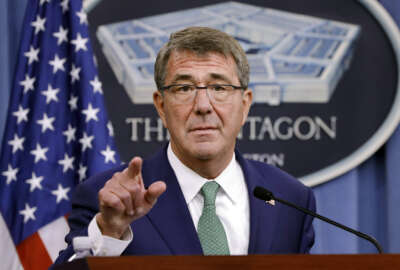
White House asks for extra $12 billion for wars overseas
The White House wants nearly $12 billion to keep extra troops in Afghanistan and to continue the fight against the Islamic State. Some members of Congress think the...
The White House is requesting an extra $11.6 billion from Congress to fund Defense Department and State Department operations against Islamic State militants and for troops in Afghanistan.
Congress has been expecting a request from the Obama administration since this summer when the President announced 8,400 troops would stay in Afghanistan through 2017. That is 3,000 more than initially expected.
The request asks for $5.8 billion for the Defense Department and $5.8 billion for the State Department.
State Department funds will support the counter-Islamic State strategy, strengthen embassy security and respond to relief and recovery needs.
“This plan reflects the evolving nature of our military campaign against ISIL and our efforts in Afghanistan. It funds initiatives based on recommendations by our commanders, reviewed by [Joint Chiefs of Staff] Chairman [Gen. Joseph] Dunford and myself and approved by the President, that will hasten the defeat of ISIL and make our nation more secure,” Defense Secretary Ash Carter said in a Nov. 10 statement. “Swift passage of this plan will help the Department of Defense and our partners in the U.S. government and around the world protect this nation, and I urge Congress to support it.”
The reaction from Congress is mixed so far.
House Armed Services Chairman Mac Thornberry (R-Texas) said he is reviewing the request in a Nov. 10 statement. He added that “the amount still does not accommodate the increased pace of operations against [the Islamic State] and does nothing to begin addressing the readiness crisis. It is time to put politics aside and provide our men and women in uniform the resources actually required, not just what is politically expedient.”
Senate Armed Services Committee Chairman John McCain (R. Ariz.) has not yet released a statement on the request. A spokesman from his Democratic counterpart Ranking Member Jack Reed (D-R.I.), said Reed is reviewing the supplemental and is supportive. He added that the request will be a “good test case of whether Republicans are interested in policy or just politics.”
Center for Strategic and International Studies senior fellow Todd Harrison said the request is right on track with what he expected DoD’s operations to cost.
The request “is an indicator I think that the Pentagon is planning for a higher level of sustained effort than had previously been indicated for [fiscal year] 2017,” Harrison told Federal News Radio.
The money will be an addition to the overseas contingency operations fund, which is not subject to sequestration caps.
The details of the request include $2.5 billion to keep the 8,400 troops in Afghanistan through 2017.
The request asks for almost $100 million for cyber infrastructure to gain access and analysis of violent extremist organizations.
About $746 million would be used by the State Department to fund diplomatic engagement expenses to fight the Islamic State. That includes expanded personnel and facility and security resources in key locations.
A total of $1 billion would go to support embassy security.
“Given the additional threats to U.S. diplomatic facilities overseas due to the spread of ISIL and other threats, this funding will enable the Department of State to speed up planned construction and security enhancements including, but not limited to, projects in Kabul, Afghanistan; Mogadishu, Somalia; Nouakchott, Mauritania; N’Djamena, Chad; Erbil, Iraq; Gaziantep, Turkey; and Adana, Turkey,” the request stated.
Republican lawmakers pushed the Obama administration to release its request as soon as possible. In September, Rep. Joe Wilson (R-S.C.), chairman of the Armed Services Emerging Threats and Capabilities Subcommittee sent a letter to the White House asking for the request.
“I am still waiting [on the budget request] and am deeply concerned that Congress has yet to receive a funding request for these critical missions,” Wilson wrote. “My concern is not about the troops levels … my concern in is committing troops without a supplemental funding request to support the mission.”
Copyright © 2024 Federal News Network. All rights reserved. This website is not intended for users located within the European Economic Area.
Scott Maucione is a defense reporter for Federal News Network and reports on human capital, workforce and the Defense Department at-large.
Follow @smaucioneWFED




